This country has:
- some of the most famous spas and thermal baths in the planet,
- world-class wine regions,
- the spiciest cuisine in Europe,
- and its economy is booming (in the last 20 years, its per capita income has soared by more than 400%!)
Beautiful plains, scenic lakes, and mild springs attract the eyes and hearts of foreigners since the times of the Roman Empire. All of this comes with the 4th lowest cost of living in the European Union.
In this country, you can literally buy a house for less than the price of a used car in the US. You can live in luxury in their elegant capital for less than the cost of living in Alabama.
And do not worry about Violence, since this country is one of the safest in the world – 7X safer than the US.
I am talking about Hungary, a place where most never considered living. But many found happiness and a good life, for very low prices.
Today, I will bring to you the pros, cons, the cost of Living in Hungary.
By the end of this article, you will also discover the best places to live in Hungary as an expat retiree.
Ready? So we start with the Pros!
Pros of Moving to Retire in Hungary

Let’s begin with a pro that may not be the most important, but is certainly the most unexpected:
The Thermal Baths.
Hungary is famous for its thermal baths, with Budapest being a key location for these natural hot springs.
The city is home to several historic thermal baths, such as Széchenyi and Gellért, which offer therapeutic benefits and a unique cultural and social experience.
These baths are integral to the local lifestyle and offer a relaxing retreat plus a place to socialize – there are meetups and you can make new acquaintances.
If all that is not enough, they also have positive effects on health. Research has shown that the water from thermal springs widens blood vessels, thus improving blood circulation and relaxing muscles. It also alleviates stiffness and pain in chronic joint and spine disorders.
Another positive aspect of living in Hungary is that it is a very plain country, so…
Cities are very walkable
…and also good for those who love cycling, like me.
In many parts of places like Italy, or Greece, or Portugal, if you want to walk around you would need to go up and down hills and stairs and all those obstacles. In Hungary, this isn’t a concern.
And if you are tired of walking and cycling, in medium and large cities in Hungary, you can rely on a…
Very efficient public transport system.
In smaller cities like Szeged, public transport options include trams, buses, and even rentable scooters.
In the capital, Budapest, the tram network is one of the largest in Europe, with trams running every 2-3 minutes, ensuring quick and reliable service across the city.
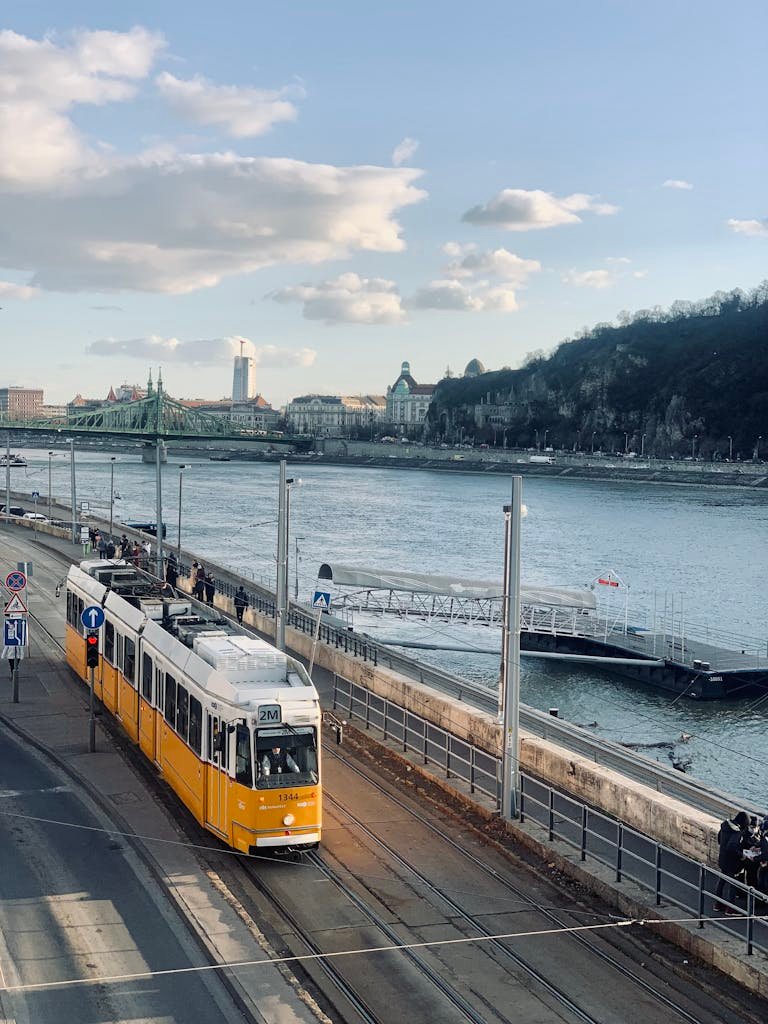
This system is complemented by the underground metro, buses, and other public transport options, covering all areas of the city and its surroundings. A monthly public transport pass in Budapest costs around the equivalent of $30 for an adult, while seniors and students enjoy significant discounts, paying as little as $10 per month.
I think that the biggest downside of the public transport in Budapest is that some stations have insanely fast-moving escalators fast to the point that elders should take a lot of care to not trip and fall. My mom for example was afraid of using them exactly for this reason. If anyone knows why these escalators are so fast, please share in the comments—I’ve never seen anything like this elsewhere in Europe.
A third good aspect of living in Hungary as a foreign retiree, and now we enter into more important things, is that…
It is Exceptionally Safe (Including Budapest)
The homicide rate in Hungary is less than 1 per 100.000 residents per year. To put it into perspective, the safest state in the US is Maine, with almost double this rate.
This is what a resident told me about safety in Hungary:
“Hungarian culture is very honest and believes in hard work to earn what you have. They are proud people who wouldn’t take pride in stealing. They are very critical of themselves and therefore hold themselves to a high standard.”
I agree with him, at least this is the experience I had with the Hungarians I met.
The surprising thing about Hungary, however, is that even the capital, Budapest, is relatively safe. Something not common in Europe nowadays – think about how cities like Paris or Brussels are way more violent than the countryside of France or Belgium.
When I asked a local why Budapest in special is so safe, he told me this:
“Budapest is safe because people are not poor enough to rob others and they are not rich enough to attract people that would rob them.”
I am not sure if he was talking seriously or just joking, but sounds plausible.

The next positive thing is the low cost of living in Hungary.
Here is another curious case where even the capital is not expensive.
Remember when I told you in the beginning that Hungary was the 4th cheapest country in the European Union? Well, the 3rd Cheapest is Poland – Poland in general has a lower cost of living than Hungary.
However, Warsaw, the Polish capital, is 76% more expensive than Budapest, the Hungarian capital!
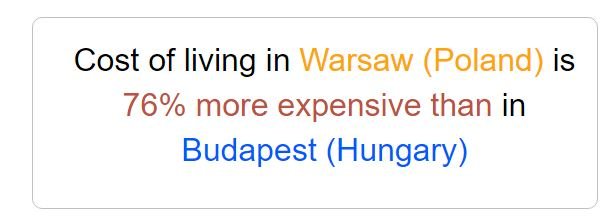
Other Central European capitals like Prague are also more expensive than Budapest.
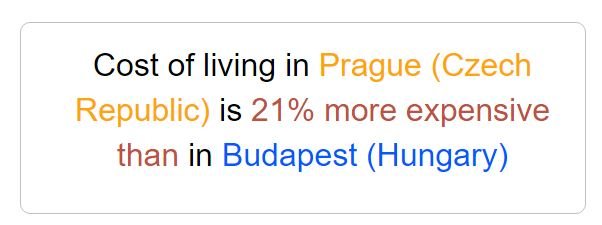
That makes the Hungarian capital one of the last really affordable European capitals.
You can rent a two-bedroom apartment in Budapest’s 8th district, just 1 minute from a metro station, for less than 600 euros per month, or less than 700 dollars, with utilities typically adding another 100 to 150 euros.
Outside the capital, costs are even lower. For example, in Szeged, you can rent an apartment in the city center for about 200,000 to 220,000 forints per month, which is approximately 250 to 275 USD.
A larger, 120-square-meter apartment on the outskirts of Szeged can be rented for around 170,000 forints per month, equivalent to about 200 USD. Food prices in Hungary are also relatively low, except for bread which is a bit on the higher side – 700 forints, or approximately $2.
Dining out is a bargain.
A decent quality meal in a restaurant costs between 2,000 to 3,000 forints, which is about 6 to 9 USD.
For example, Lecso Hungarian Restaurant, one of the best eateries in Budapest, serves you a traditional beef goulash (and Hungarians are the masters of Goulash) for 2890 forint. This is around 8 dollars. Less than what you would pay for a Burger King Whopper in the US. Tip: The Goulash is better, much better, than the Whopper.
Another huge positive aspect of Hungary is the real estate opportunities.

First of all, Hungary is one of the easiest countries in Central Europe to buy property.
In certain European countries, like Poland, if you are a non-EU citizen you cannot buy a house unless you go through a complicated and bureaucratic process. And I know that from my own experience.
In Hungary, you can—it is much easier, maybe not as easy as in Spain or Portugal, but not that complicated either. But the biggest attractions when we talk about Real Estate in Hungary are the prices. Those prices are simply spectacular!
I am talking about manors, almost palaces, for the same price as a tiny apartment in the US. In a few paragraphs, I will show you some examples. However, before jumping into this extremely attractive side of Hungary, I feel obliged to also tell you about the negative aspects.
The Cons of Living in Hungary
Healthcare.
The public healthcare system in Hungary, while functional, has its challenges. There can be long waiting times for certain treatments, and the facilities might not meet the expectations of expats used to Western European or North American healthcare standards.
Private healthcare, while better, is also not among the best. The good thing is that Hungary is a very central country in Europe, so in case you need some complex treatment, it is very easy to travel to countries like Austria, the Czech Republic, or Germany, where hospitals are more reliable.
Just remember to have health insurance that covers international treatment.
The second con is the high taxation (VAT)
Here I am not talking about the income taxes—these in Hungary are relatively low. In most cases, a foreign retiree living in Hungary will pay a flat rate of 15% in income taxes, much lower than countries like France, for example.
Hungary has treaties with multiple countries to prevent double taxation on income. So income tax is not the problem.
The problem is the VAT.
Hungary has the highest VAT in the entire world—27%. Even Sweden has a lower VAT rate—25%. This high VAT significantly increases the cost of goods and services, making certain purchases much more expensive for both locals and expats.
This tax burden can be especially noticeable when buying higher-priced items like electronics.
The third point—and this is probably the most famous one—is the…
Language Barrier.
Hungarian, known as Magyar, is one of the most challenging languages for foreigners to learn. First, Hungarian is not an Indo-European language, unlike English, French, or Spanish. It belongs to the Finno-Ugric language family, which shares little in common with most European languages.
It is an entirely new linguistic universe, with not many recognizable words or structures. Second, Hungarian has a complex grammar system. It features 18 cases, where nouns change their endings based on their role in a sentence.
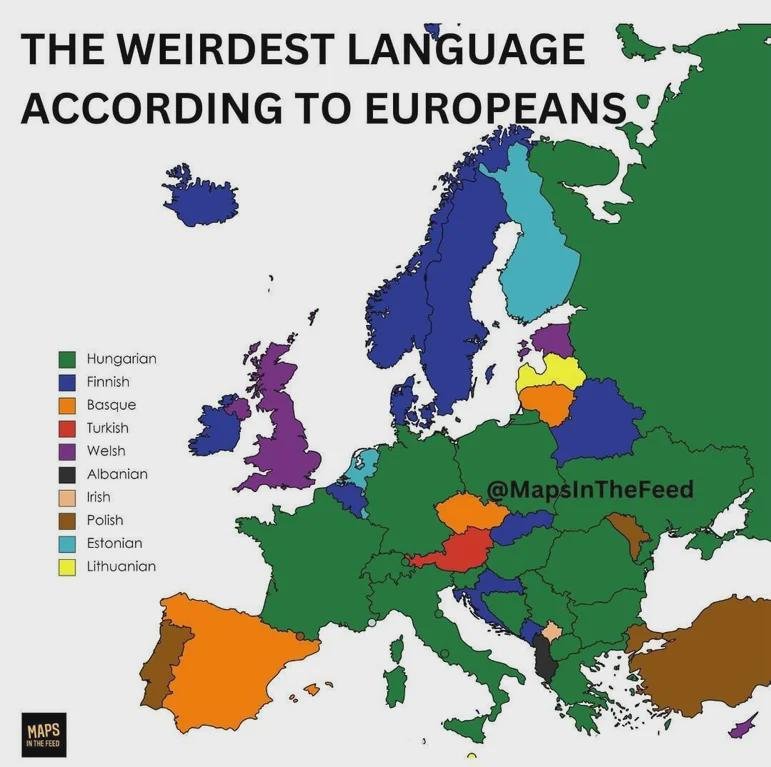
For example, “house” is “ház,” but changes to “házban” when meaning “in the house.” Such variations require learners to memorize multiple forms for each single noun.
Third, Hungarian uses agglutination, where words are formed by adding various prefixes and suffixes. This process creates long and complex words that can be overwhelming for learners. For instance, “megfoghatatlan” means “incomprehensible,” but it is formed by combining smaller word parts.
Additionally, pronunciation can be difficult. Hungarian contains several sounds not found in English, and the stress is always on the first syllable of a word.
Still, in larger cities like Budapest, many people speak English. I also recommend you at least try to learn the very basics of the Hungarian language.
The locals will like that you are making such an effort, and it will help in your integration. The method I use to learn new languages which I recommend is this one (by using this link you get a 40% discount after trying for free): https://www.lingq.com/?referral=LevideSouza
Since we are talking about the language…
The next barrier is actually cultural.
Hungary has a more reserved and formal culture compared to many Western countries. Social integration might take time, and the pace of life, especially outside Budapest, is slower, which might not suit everyone.
Hungarians are not Slavic, but on this point here, they look similar to the Slavs. And another con, that might not really be a con if you are from the EU, but it might be a problem if you are from outside the EU, is the bureaucracy to obtain a residence permit.
Fortunately, Hungary offers a Golden Visa program, which allows investors to obtain residency by making an investment in Hungarian real estate or businesses. This visa provides not only residency but also a pathway to citizenship.
If you want to know more about the Hungarian Golden Visa, just leave a comment in the comment section, and I will do another article about it.
Now, remember when I promised to tell you the 3 best cities to live in Hungary as a foreigner retiree?
Time for that.
The Best Cities to Live and Retire in Hungary
And the first city we recommend is… Miskolc…. I am kidding.
The first city we recommend for foreign retirees is Budapest.
And if you are used to my content, you might be surprised because I almost never recommend capital cities to my public. They are more expensive, noisier, have more traffic, and, in many cases, they are more dangerous. Yes, Paris, I am talking about you.
However, in the case of Budapest, this is not really true. Yes, it is much bigger than the average Hungarian town, it has a population of 1.8 million residents, which is a size similar to Vienna and Hamburg, for example. But the size does not make it too expensive. As I said before, Budapest is much cheaper than other central European capitals like Warsaw or Prague, while offering a comparable level of infrastructure.
The city has plenty of beautiful parks, like the Városliget and Margitsziget. 26% of Budapest’s city center is covered by trees – for comparison, only 1.4% of London’s downtown has tree coverage. This makes Budapest a remarkably green city. The Hungarian capital also has a growing network of cycling paths, particularly along the Danube River and in the Buda Hills.
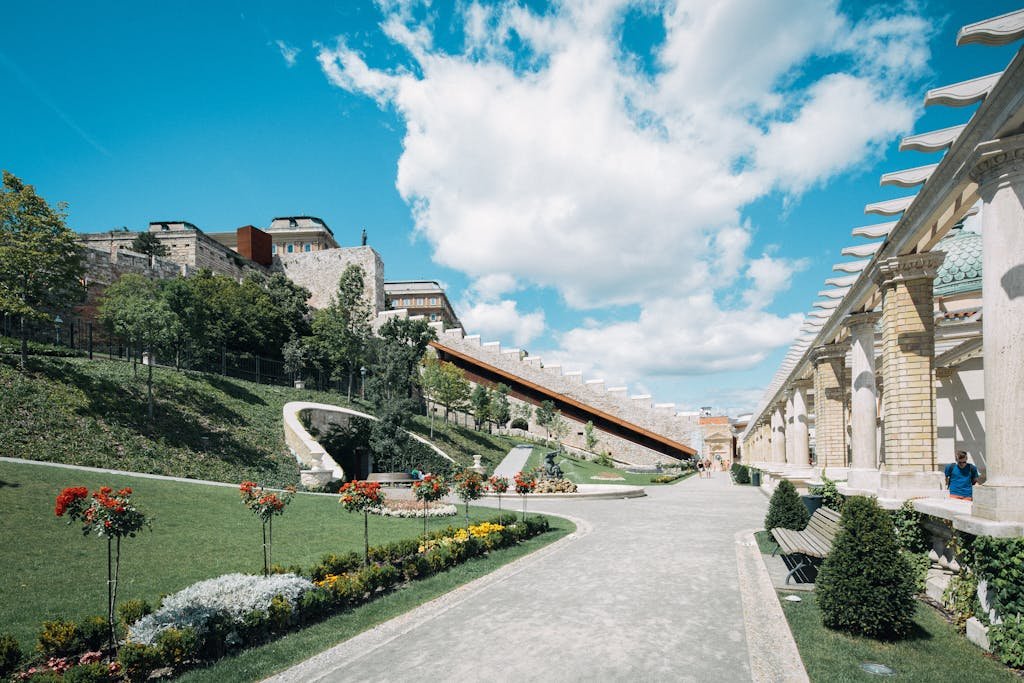
The city’s healthcare infrastructure is well-regarded, with several top-tier hospitals and clinics. Notable institutions include Semmelweis University Clinic and the Buda Health Center, both providing a high standard of care.
The Budapest Ferenc Liszt International Airport is located only 16 kilometers from the city center. The airport is easily accessible by public transport, and, get ready for some really good news:
This airport is the main hub of Wizzair—a very inexpensive Hungarian airline that allows you to visit nearly anywhere in Europe. If you are American, imagine Wizzair as being the European version of Spirit Airlines.
But with much better quality and, I guess, fewer chances that you will be assaulted by a fellow passenger.

Now, where are the best places to live in Budapest?
Well, Budapest can be divided into 2 big “halves”: Buda and Pest, and for expat retirees, the best recommendations are in Buda.
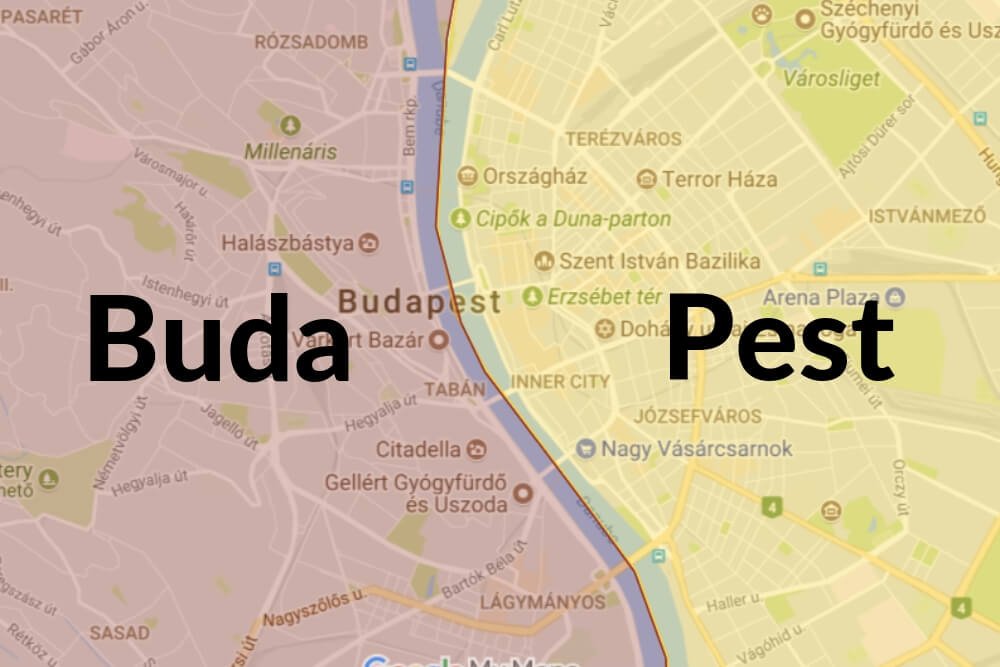
This is what a resident told us: “Buda part is rather chill, much greener. You cannot really find anything shady there.”
Districts 1, 2, 3, 11, and 12 in Buda are particularly attractive – they are known for their green spaces, quiet neighborhoods, and good connections to other parts of the city.
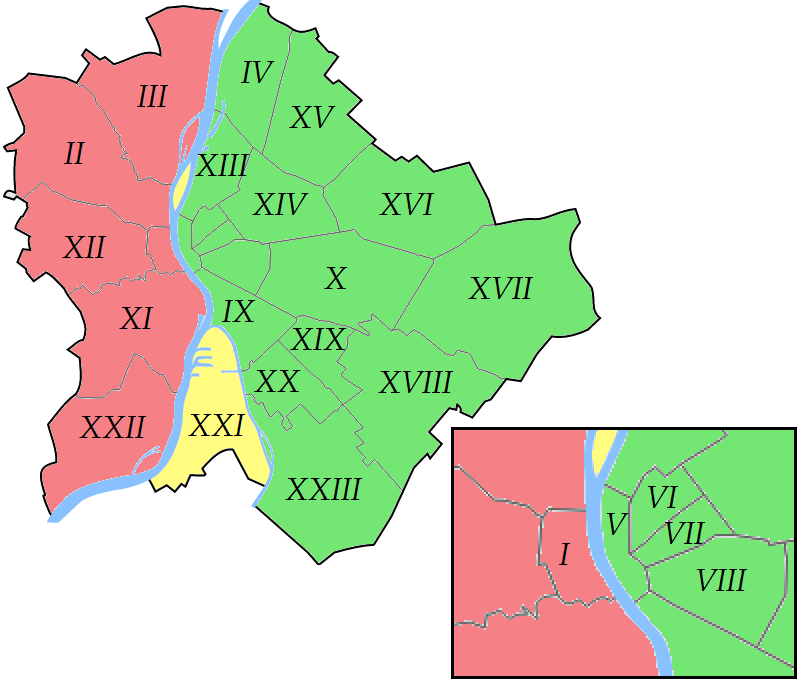
Some locals also might tell you that these districts are expensive, so let’s check the prices there.
What can you afford in the best districts of Budapest for the same value of renting a little studio in Chicago: US$1512, which is the same as 536,000 Hungarian forints?
I found this spacious 3-bedroom apartment, fully furnished, in the 1st district, in the heart of Buda, just under the castle and just a short walk from the splendid promenades of the Danube River.
The price? 490,356 forint, or 1250 euros – this is less than 1400 US dollars.
So you can live in a renovated, spacious, and bright 3-bedroom apartment in the heart of a safe European capital for less than what you pay in a small studio in a violent area of Chicago.
If instead of living in a 3-bedroom apartment you prefer a 2-bedroom apartment, there are options in the XII district for 313,000 forints per month—just 880 dollars.
If instead of renting, you prefer to purchase a house so you can qualify for a Golden Visa, in a few paragraphs I will show you what you can buy in Hungary, and it will be mind-blowing, so keep reading.
Now let’s say that instead of a capital with 1.8 million people, you prefer to live in a smaller and calmer city, but still with good infrastructure. The next city we recommend is exactly that, and for those thinking of retiring in Hungary, this place is much cheaper than Budapest.
Szeged.
It is the third-largest city in the country, with 161 thousand residents, and is known for its educational institutions and cultural events.
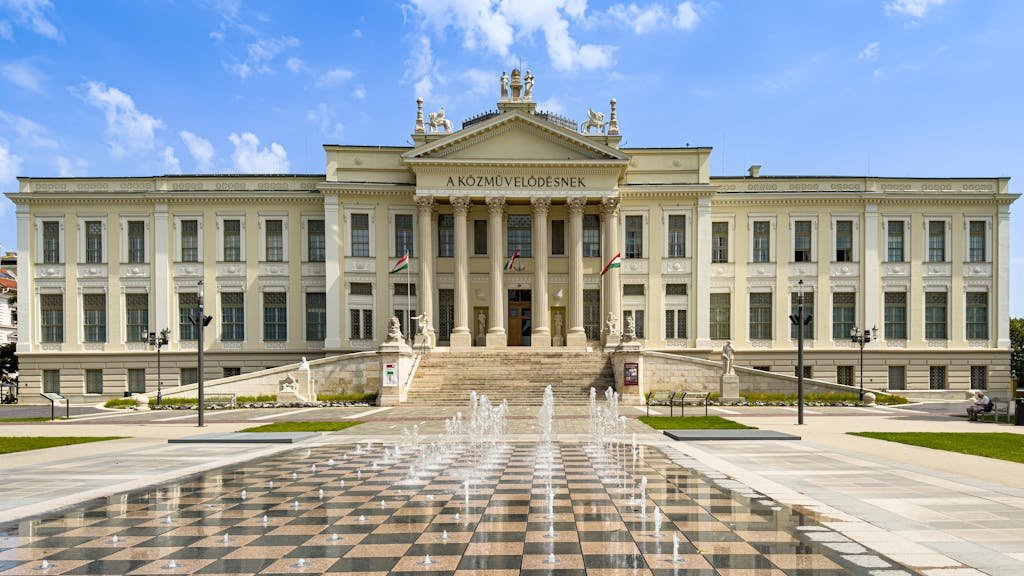
Szeged is also noted for its mild climate and high number of sunny days, making it an appealing option for retirees seeking a comfortable environment. Public transportation in Szeged is well-developed, with trams, buses, and trolleybuses servicing the city.
A monthly public transport pass costs the equivalent of 22 dollars. The city also has a decent range of healthcare facilities managed and operated by the local universities.

The facilities managed by the University of Szeged Albert Szent-Györgyi Medical School are especially well renowned. The city’s slower pace and lower cost of living make it an attractive choice for those looking to retire on a budget. Located in Hungary, Szeged offers a unique blend of cultural experiences and modern amenities that appeal to retirees. With its stunning architecture, beautiful parks, and vibrant community life, it is among the best cities for retirement. Additionally, the medical school’s facilities ensure that retirees have access to high-quality healthcare, further enhancing the appeal of this picturesque city for those seeking a peaceful retirement lifestyle.
The cost of living in Szeged is significantly lower than in Budapest. Rental prices for a one-bedroom apartment in the city center are around 250 US dollars per month.
It is perfectly possible to find an apartment already furnished, in the center of the city, for only 160,000 forints per month—this is less than 450 dollars.
After Szeged, another city that might be a good fit for retirement in Hungary is Pécs.
Pécs is a historic city in southwestern Hungary, very close to Croatia.
It is famous for its rich cultural heritage, including UNESCO World Heritage sites. The cost of living in Pécs is lower than in Budapest and similar to Szeged.
A 2-bedroom apartment in Uránváros in Pécs goes for 200,000 forints, around 560 dollars per month.
Now let’s say that instead of renting, you want to buy a property.
A property that would qualify you to obtain a Hungarian golden visa, and then put you on the path to Hungarian citizenship.
That means a property costing at least 250,000 euros—so let’s check which kind of real estate that means. In Budapest, that would mean bright new or renovated apartments with 3 to 5 bedrooms in good locations.
If instead of a big city, you prefer to live in the countryside, for less than 300,000 euros, you can buy a 4-bedroom house in Palotas, just 1 hour away from Budapest, with your own fishing pond!
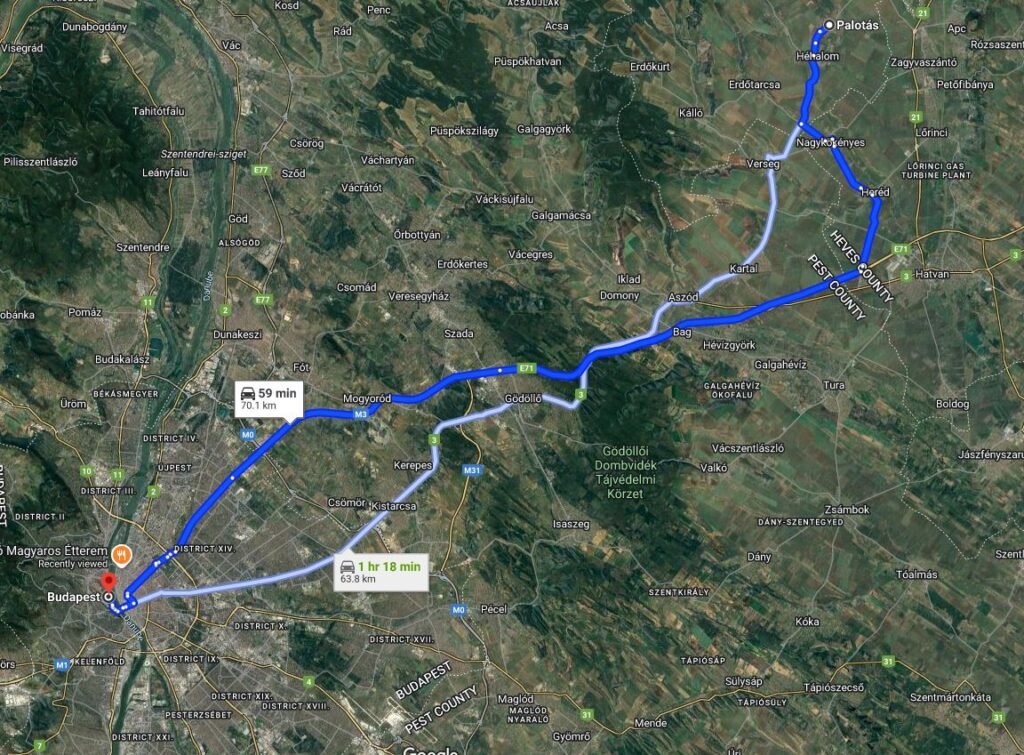
That sounds like a retirement retreat to me!
But if the Hungarian language intimidates you, there is another place in Europe that is trying to lure expat retirees by offering lower taxes, and they speak a much easier language. If you want to discover all the things they can offer you, just check this article about retirement in Andalusia.
Levi Borba is the founder of expatriateconsultancy.com, creator of the channel The Expat, and best-selling author. You can find him on X here.




